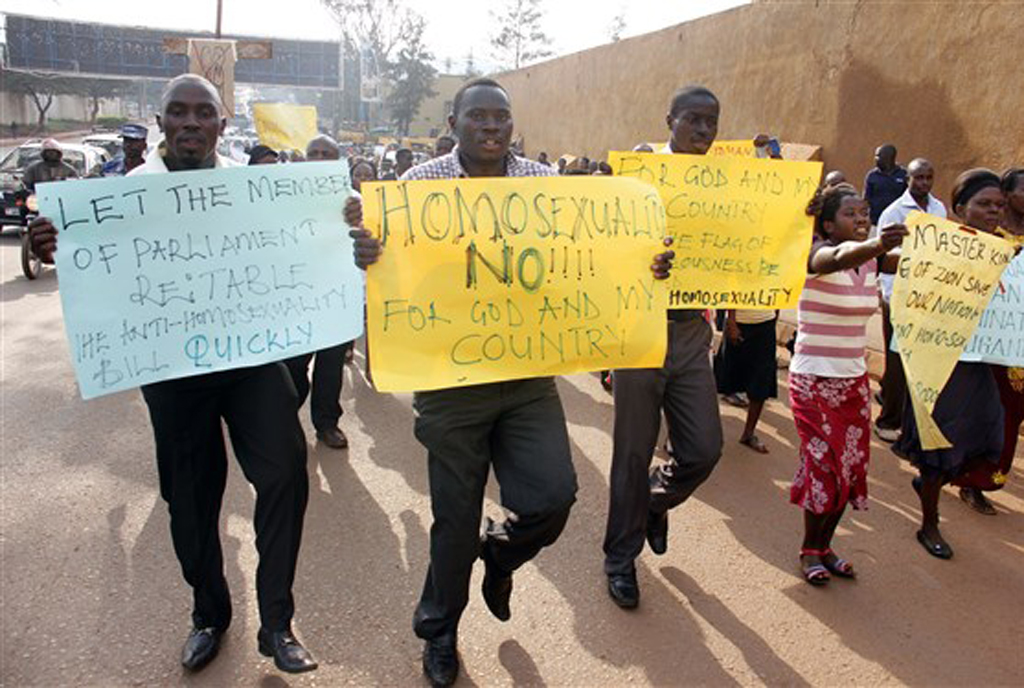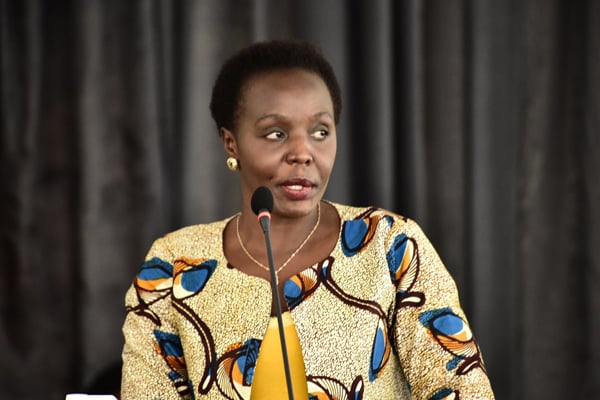Uganda criminalises homosexuality again

Anti-Homosexual activists march on the streets of Kampala carrying placards on August 11, 2014 to demonstrate against the recently annulled Anti-Gay law by Ugandas constitutional court. AFP / Isaac Kasamani
What you need to know:
- The new legislation also bans prostitution, which is already criminalised under the Penal Code Act, ostensibly in order to protect family unity and values.
Clause 6 of the Bill proposes that indecent communication where a person by whatever means send material of a sexual nature to another person without the consent of that other person be fined three hundred currency cents (shs6 million) or be imprisoned for seven years or both.
Uganda has for the second time within seven years criminalised gay sex and this time imposed a 10-year jail term for convicts.
The new offence and penalties were contained in the report of the Legal and Parliamentary Affairs Committee presented to the House, and Members of Parliament scrutinising provisions of the Sexual Offences Bill, 2019, passed them on May 3.
The original version of the Bill sponsored by the Uganda Women Parliamentary Association (UWOPA) only imported the Penal Code Act provision on “unnatural offences” and did not expressly criminalise or ban gay or lesbian sex.
However, the enacted Bill in Clause 11 criminalises and bans “penetration of another person’s anus with other person’s sexual organ or with any object and, (ii) sexual acts between persons of the same gender”.
Uganda first criminalised homosexuality and imposed life imprisonment penalty for convicts in 2014 and President Museveni, while signing the anti-gay Act of Parliament into law, said Ugandan scientists had convinced him that homosexuality was an act of nurture, not nature.
“… [so], society can do something to discourage the trend,” he said during the then televised signing ceremony.
The law, however, kicked up diplomatic storm, straining Uganda’s relations with donors and opened up the country to both scrutiny and condemnation by rights groups across the world.
Following a petition by gay rights advocates, the Constitutional Court on August 1, 2014, quashed the law on technicality --- that it was enacted without quorum --- in the same week that President Museveni lifted off for the US-Africa summit in Washington DC.
Mr Museveni, upon return, warned Members of Parliament who wanted to reactivate the legislation to “go slow” because the law had “foreign policy implications”. The debate died down until the sudden introduction of a provision to criminalise and ban sex between same gender in the newly-enacted legislation.
The Bill, now an Act of Parliament, will become law only when President Museveni assents to it, if he will.
During debate on the Bill on the floor of the House this week, the State Minister for Planning and Ndorwa West MP, Mr David Bahati, who championed the original Anti-Homosexuality Act, said he supported the new legislation because it protects the dignity of African societies and people.
“I support this Bill. This Bill will protect values of our society that we have lived for generations…to preserve the dignity of the African society and above all protect our children,” he said, adding: “The proportion of foreign concept should be halted and first educate people about them. They need to be looked at differently.”
MP Amoding, the mover of the Sexual Offences Bill, 2019, said the introduction of the criminalisation of gay sex was not their original idea and adopted in the “wisdom of the House (Parliament)”.
The new legislation also bans prostitution, which is already criminalised under the Penal Code Act, ostensibly in order to protect family unity and values.
Other offences also criminalised include sexual assault, indecent assault, cat-calling, indecent communication, sexual harassment, exploitation of detainees, sexual exploitation, unnatural offences, simple defilement, aggravated defilement, and incest.
However, MPs at the last minute deleted a proposal for withdrawal of consent anytime during sexual intercourse.
The Sexual Offences Bill, 2019, is to consolidate all sex-related offences into one volume.
Any person who unlawfully and indecently assaults any woman or girl commits a felony and is liable to imprisonment for 14 years, with or without corporal punishment.
Clause 6 of the Bill proposes that indecent communication where a person by whatever means send material of a sexual nature to another person without the consent of that other person be fined three hundred currency cents (shs6 million) or be imprisoned for seven years or both.
But the Legal and Parliamentary Affairs committee which scrutinised the Bill declined on the penalty referring to the 10-year jail term and 5,000 currency points under the Section 13 of the Anti-pornographic Act
Committee report
The Jacob Marksons Oboth report further declined that consent be removed from the provisions since it will be difficult to prove.
Unsolicited touching, pinching and patting will attract a fine not exceeding two thousand currency points or to imprisonment not exceeding ten years or both.”
“It is important to note that currently, sexual harassment is not a criminal offence under the laws of Uganda except in the Employment Act. The Committee has examined the Bill and supports the proposed criminalisation of sexual harassment.
The Committee notes that currently, incidents of sexual harassment have been on the increase yet the law does not sufficiently deal with the matter,” Mr Oboth said.
The committee, which tabled the amendments in Parliament on Monday night, that any person involved in incest is imprisoned for life.
Section 11 of the Bill further proposes that unnatural offences will involve persons who performs a sexual act with another person contrary to the order of nature or engages in a sexual act with an animal and commits an offence and is liable on conviction to imprisonment for ten years.
However, the committee recommended that Clause 11 be maintained but redefined to redefine the clause to the “penetration of another person’s anus with that other person’s sexual organ or with any object; and a “ban on a sexual act between persons of the same gender”. Convict under this Bill will be registered and their data retained at National identification and Registration Authority.
The Bill proposes in Clause 45 to, among others, decriminalise prostitution by deleting sections 137, 138 and 139 of the Penal Code Act.
The provisions proposed for deletion are those that prohibit the keeping of a house, room, set of rooms or place of any kind for purposes of prostitution, the provision that defines prostitution and the provision that prohibits prostitution, respectively.

However, Mr Oboth said to preserve the country’s values, they will retain the law against prostitution.
“The Committee notes decriminalising prostitution will be contrary to public policy and cultural norms since most cultures in Uganda frown upon sex work. The Committee has also considered legalizing prostitution will hurt the society, the young children and the family unit. The Committee was further concerned that prostitution might lead to the break down in families and the institution of marriage since a number of people might resort to prostitutes instead of sticking to their partner,” the committee noted.
It added: “The proposal to delete clauses 132, 138 and 139 be rejected since they are still good laws. The offence of prostitution should be maintained on the law book save that it should be expanded to attach criminal liability to a person who pays for sexual services.”
Another contentious section was withdrawal of consent during sexual act but the committee was concerned that it would be difficult to enforce.
The new legislation also bans prostitution, which is already criminalised under the Penal Code Act, ostensibly in order to protect family unity and values.
Other offences also criminalised include sexual assault, indecent assault, cat-calling, indecent communication, sexual harassment, exploitation of detainees, sexual exploitation, unnatural offences, simple defilement, aggravated defilement, and incest.
What public thinks about the legislation
“I heard [that] the Bill was passed depending on where and whom they [were] targeting. If it is targeting minors and paedophiles, it is a welcome law,” Charles Yakani, IT specialist.
“I have heard about it, but I have not put too much interest in it because I have been busy looking for money. Sometimes these MPs bring in Bills that do not make sense,” Stephen Katongole, businessman.
“I saw something on social media to the effect that a woman can withdraw consent during sexual intercourse. Sex cannot be satisfied without another partner. Withdrawing from it is selfish. [MPs deleted this provision – Editor],” Didas Orikiriza, businessman.
“I have not heard anything like that (Enactment of the Sexual Offences Bill, 2019]. I am a busy man guarding many sites. I do not have the time to follow news,” Peter Odongo, security guard.
“Uganda will be the first country to enact that kind of law [criminalising prostitution] because in developed countries, we have brothels where you buy sex and it is legal. What happens here now when you criminalise transactional sex, do you want people to go for animals?” Prossy Patra, radio presenter.
“Laws [in Uganda] do not excite me much because of poor enforcement. Most of the laws that deal with gender issues and protection of women’s rights are passed for formality. I feel that the 10th Parliament is just rushing to pass these Bills because the business of the House is coming to an end” Miria Matembe, former Ethics minister.
“I am happy that it addresses some of the issues we have been advocating, including penalties for sexual harassment, rape, among other offences. However, I feel there are areas it touches that might go against the right of privacy,” Pheona Wall Nabaasa, Uganda Law Society President
Compiled by Stephen Otage & Esther Oluka




